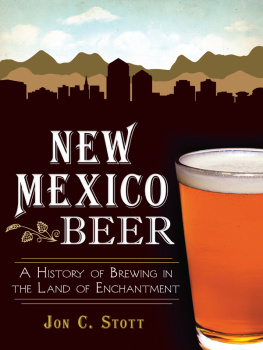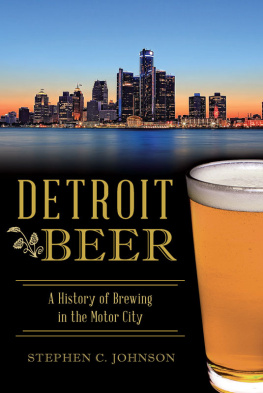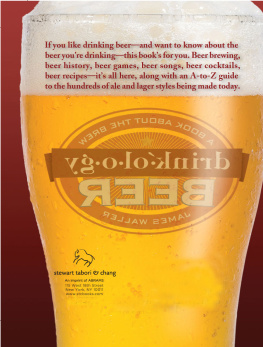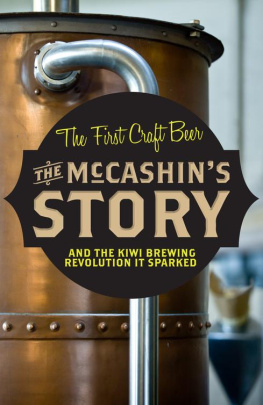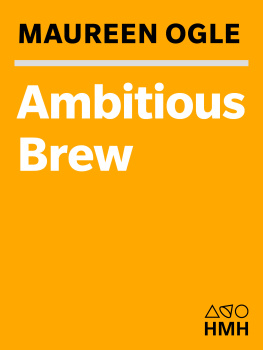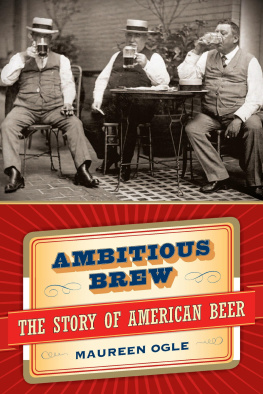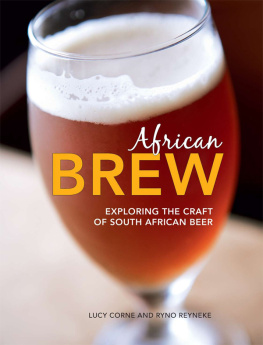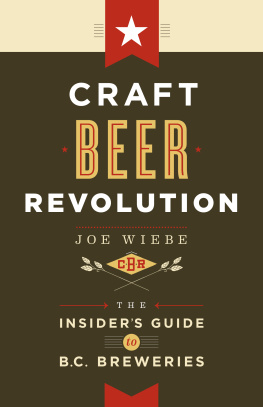BREW
BRITANNIA
Jessica Boak and Ray Bailey have been blogging about beer at boakandbailey.com since 2007, inspired by an eye-opening trip to Nuremberg. They have written articles for the Campaign for Real Ale and the Brewery History Society, among others. They live in Penzance, Cornwall.
JESSICA BOAK & RAY BAILEY
BREW
BRITANNIA

THE STRANGE REBIRTH OF
BRITISH BEER

First published in 2014
by Aurum Press Ltd, 7477 White Lion Street, London N1 9PF
www.aurumpress.co.uk
This eBook edition first published in 2014
Copyright Jessica Boak and Ray Bailey 2014
Jessica Boak and Ray Bailey have asserted their moral right to be identified as the Authors of this Work in accordance with the Copyright Designs and Patents Act 1988.
All rights reserved
This eBook is copyright material and must not be copied, reproduced, transferred, distributed, leased, licensed or publicly performed or used in any way except as specifically permitted in writing by the publishers, as allowed under the terms and conditions under which it was purchased or as strictly permitted by applicable copyright law. Any unauthorised distribution or use of this text may be a direct infringement of the authors and publishers rights, and those responsible may be liable in law accordingly
eBook conversion by Quarto Publishing Group USA
Digital edition: 978-1-78131-271-1
Softcover edition: 978-1-78131-186-8
PROLOGUE
H alf a century ago, the last rites were being said for British beer. In 1965, Christopher Hutt arrived in Norwich as a new student. He had grown up in a village in the North West of England, where good beer was a part of everyday life, and had learned to drink in the pub on the green with his cricket team, enjoying jugs of traditional draught ale. But he realised with growing horror that, in the city where he was studying, it was almost impossible to find anything worth drinking.
In East Anglia, Hutt found that the three local breweries were in the process of being taken over by a national giant Watneys and that, in all of the citys beautiful medieval streets, there was only one pub selling what was then known as traditional draught beer. Hutt is an important character in our story, but in 1965 he was just a young man who appreciated a decent pint. The village idyll back home, it turned out, was atypical: elsewhere, Britains traditional beer culture was already starting to decay.
Trad draught more often called real ale was sufficiently bitter that acquiring the taste took effort, becoming something of a rite of passage into adulthood. Ideally such beer was served at cellar temperature (around 12C to 14C), so that the subtle flavours of the ingredients, for better or worse, could make themselves known. Contrary to popular belief, it wasnt flat, but was only gently carbonated, meaning that there was little to distract from the essential quality of the product. It tasted of something.
The new type of keg beer that had taken over in Norwich was the opposite of an acquired taste: it pandered to the palates of those brought up on white sliced bread and processed cheese, being relatively sugary, pricklingly fizzy, chilled and pasteurised. Though it had its defenders, it seems that no one loved keg beer, and plenty of people hated it. Hutt certainly did.
Informed by his experiences in Norwich, Hutt would go on to write a book with an apocalyptic title: The Death of the English Pub.
In 1970, another large brewing company, Bass Charrington, announced plans to close at least eight local breweries across the UK, concentrating production at a vast new computer-controlled facility near the ICI chemical works in Runcorn, Cheshire.
Not only were drinkers being deprived of the opportunity to partake of distinctive local beers, but entire historic styles of beer were disappearing. On its last legs for decades, porter a black beer on which the British brewing industry had been built in the eighteenth century finally became extinct in 1973, when Guinness ceased production of the last remaining example. Stout, which had evolved from porter, was becoming rather inbred, with only Guinness and a few other breweries bottled efforts left on the market. And hardly anyone drank mild any more.
By 1976, there were just 147 breweries in existence in the UK owned by 82 companies, and barely any beer on sale that wasnt one of a handful of near-identical bitters.
And yet, though the cover of Christopher Hutts book showed a funeral wreath placed over a pair of hand-pumps, he had also sounded a note of hope: This is one corpse that can still be revived.
Bristol, 27 December 2013
Even in the post-Christmas doldrums, and despite the weather, the city-centre streets of the capital of the West Country are busy with evening drinkers. Many, including us, are converging on cobbled King Street. Just 200 metres long, it has traditionally been home to a run of drinking establishments, but over the last year it has undergone a marked change.
What was previously a nightclub has become The Beer Emporium. Housed in a Victorian industrial building, it has an atmospheric vaulted cellar bar of exposed brick. When we first visited in August, we found it crammed with earnest twenty- and thirtysomethings drinking expensive imported American India pale ale by the half-pint, or locally produced Belgian-style sour beer from champagne glasses. It boasts twenty-four taps, as well as fridges crammed with bottled rarities from around the world. Fifteen years ago, this might have been the most remarkable selection of beer on offer in any pub in the British Isles. Now it isnt even the best on the street, and we walk on by.
A few doors down, The Famous Royal Navy Volunteer has known various incarnations. An old maritime tavern, in the 1970s it was a hangout for young people, with Barry White on the juke box,hymn-board. India pale ales, double India pale ales, saisons, sours, lagers, wheat beers and stouts vastly outnumber anything resembling traditional British bitter, but everything on sale is made in the United Kingdom, and much of it is brewed in Bristol or in one of the surrounding counties.
But there is more. We are heading for the end of the street where, on the site of what was previously a shots-n-lager party venue, a third craft beer place has just opened. Its name is Small Bar (tagline: Big Beer) and it is by far the trendiest of the three locations. A local street food vendor is in residence, selling burgers in artisan buns. What looks like a hundred retro light bulbs dangle on cords from the ceiling, their coiled filaments casting a gentle orange glow over the unpainted brickwork and reclaimed furniture. The beer menu here is made from old wooden transport pallets with each brews name, origin and alcoholic strength chalked onto interchangeable black planks and hooked in place.
We choose a locally made Flemish-style sour brown ale and a strong, American-style India pale ale from Derbyshire. Neither beer is remotely designed to appeal to a broad audience. Both beers are served in dainty stemmed glasses printed with the bars logo. Taking a seat on tall, wobbling stools apparently constructed from bicycle seats with slender fashion models in mind, we peruse the list of bottled beers available, which is, of course, housed in a carved-out childs encyclopaedia.
Next page

